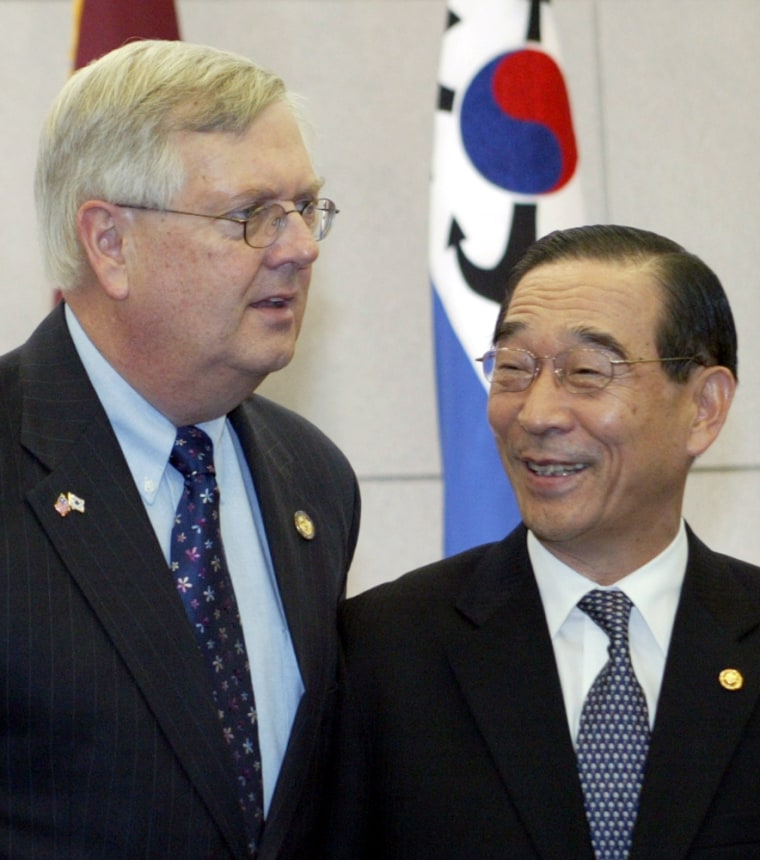North Korea on Friday said it would return to six-party nuclear talks and would consider treating the United States as a “friend,” shortly after a U.S. congressional delegation concluded talks with the North and said it appeared ready to negotiate.
“Our unanimous impression is that the DPRK is ready to rejoin the six-party process,” said Rep. Curt Weldon, R-Pa., referring to the North’s official name, Democratic People’s Republic of Korea.
Weldon, vice chairman of the House Armed Services Committee, led a bipartisan delegation that held talks in Pyongyang with North Korea’s No. 2 leader, Kim Yong Nam, Foreign Minister Paek Nam Sun and Vice Foreign Minister Kim Kye Gwan, who is also North Korea’s chief representative to nuclear negotiations.
Hours after the American lawmakers left Pyongyang, the North Korean regime said it would not only return to nuclear talks but also treat the United States as a “friend” as long as Washington doesn’t slander the rule of totalitarian leader Kim Jong Il.
The North Korean overture, although attached with conditions, was highly unusual, coming after months of harsh anti-American rhetoric.
The United States, North and South Korea, China, Japan and Russia have struggled to arrange a new round of talks aimed at persuading the North to abandon its nuclear weapons programs. The three prior rounds, hosted by China since 2003, made no breakthroughs. The last round was held in June.
Trip called an 'overwhelming success'
Weldon, who spoke on behalf of his delegation, called the four-day trip an “overwhelming success.” The delegation, composed of six American lawmakers, flew from Pyongyang to Seoul earlier Friday to brief South Korean Foreign Minister Ban Ki-moon, Defense Minister Yoon Kwang-ung and local lawmakers on its Pyongyang trip.
North Korea is waiting for President Bush to be sworn in for his second term and complete his foreign policy lineup before deciding whether to rejoin the six-nation talks, Weldon said.
“And they are looking to see if any other comments would come out of Washington that would be negative or that would cast a negative aspect or negative feeling about the DPRK and its leaders,” he said.
Although the Congressional delegation did not represent the U.S. administration, the Republican and Democratic lawmakers assured North Korea that Washington does not seek a regime change or to launch pre-emptive attacks on the isolated country, Weldon said.
Talks in Pyongyang included a 10-hour meeting with Kim Kye Gwan, the key nuclear negotiator. During those talks, the U.S. congressmen stressed that the United States and North Korea can “live together” once the communist state meets the American demand for a “total and complete removal” of its nuclear programs.
North Korea has cited a “hostile” U.S. policy as the key stumbling block to ending the two-year nuclear standoff and demanded Washington provide a nonaggression treaty and compensation in return for ending its nuclear programs.
There was no immediate North Korean announcement on the results of the talks.
Rising hopes
The Congressional trip came amid rising hopes that the nuclear talks could resume after Bush’s inauguration.
Besides the Weldon delegation, one led by Rep. Tom Lantos, the top Democrat on the U.S. House International Relations Committee, recently met with senior North Korean officials in Pyongyang.
Washington has reportedly decided to remove one of its harshest critics of Pyongyang’s totalitarian regime, Undersecretary of State John Bolton, from the next administration.
Bolton took a vehement stand against North Korean leader Kim Jong Il. His removal was expected to appease Pyongyang, which has called him “human scum” and refused to accept him as a dialogue partner.
The nuclear dispute erupted in late 2002 when Washington accused North Korea of running a secret uranium enrichment program in violation of international nonproliferation accords and cut off free oil shipments. North Korea denied the claim, quit the Nuclear Nonproliferation Treaty and restarted its mothballed plutonium weapons program.
